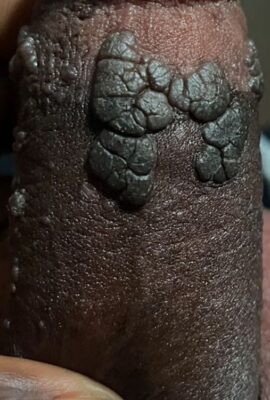Genital Warts: Causes and Risk Factors
If you have ever heard about genital warts and wondered what causes them, you are in the right place. Genital warts are a common health concern, and understanding their causes and risk factors can help you stay informed and proactive. In this article, we will look into what makes these annoying growths show up, focusing on their link to HPV and how they spread.
What Are Genital Warts?
Genital warts are small, fleshy growths that appear in the genital or anal area. They can look like tiny cauliflowers or flat bumps. These warts often cause itching or discomfort but they are not usually painful. They are one of the most common sexually transmitted infections (STIs) worldwide. The main culprit behind them? Human Papillomavirus (HPV).
click here to order warts combo for warts treatment
The HPV Connection
HPV is a family of over 200 viruses, and certain types cause genital warts. According to research, specifically, low-risk HPV strains, like types 6 and 11, trigger about 90% of genital wart cases. These strains differ from high-risk HPV types (like 16 and 18), which can lead to cancers. It has been shown that HPV infects the skin and mucous membranes, causing cells to grow abnormally and form warts. Over 70% of sexually active adults will encounter HPV at some point, but not everyone develops warts. Your immune system often fights it off before symptoms appear.
How Do Genital Warts Spread?
According to research, HPV spreads through skin-to-skin contact, mostly during sexual activity. This includes vaginal, anal, or oral sex. You don’t need intercourse to catch it—any genital contact can do the trick. The virus enters tiny cuts or abrasions in the skin, setting up camp. Condoms reduce the risk but don’t fully prevent transmission since HPV can infect areas condoms don’t cover. Sharing sex toys or even non-sexual contact (like contaminated towels, though rare) can also spread it.
Here’s a wild fact: you can spread HPV without visible warts. A research found that asymptomatic carriers—people with no symptoms—can still pass it on. That’s why genital warts are so common, with millions of new cases yearly. Skin trauma, like shaving or friction, can also make it easier for HPV to take hold.

Key Risk Factors
Certain habits and conditions make you more likely to get genital warts. These include:
- Unprotected Sex: Skipping condoms increases HPV exposure. Multiple partners also raise the risk.
- Young Age: People in their teens and 20s face higher risk due to active sexual lifestyles.
- Weak Immune System: HIV, stress, or poor diet can weaken your defenses, letting HPV thrive.
- Smoking: Tobacco harms immunity, making HPV infections more likely to persist.
- Skin Trauma: Cuts or irritation in the genital area give HPV an easy entry point.
- Multiple Partners: More partners mean more chances of encountering HPV.
- Previous STIs: Having other STIs, like chlamydia, can weaken skin barriers, aiding HPV spread.
click here to order TMT for STIs and UTIs
Can You Prevent Genital Warts?
Here are the most effective strategies to prevent genital warts:
- Get vaccinated against HPV
- Practice safe sex
- Boost your immunity
- Avoid smoking and limit alcohol
- Maintain good hygiene
- Regular health checkups
- Strengthen skin barriers
Why do some people get warts while others don’t?
It’s a mix of immunity, lifestyle, and genetics. A strong immune system can clear HPV quietly, but stress or illness might let warts sneak through. Intriguingly, HPV can linger in the body for years, sometimes causing warts long after exposure.
click here to order immune booster
Summary
Genital warts come from low-risk HPV strains, spreading through skin-to-skin contact during sexual activity. Unprotected sex, multiple partners, smoking, and a weak immune system crank up your risk. By understanding these factors, you can make smarter choices about your health. Got questions or concerns? Chat with your healthcare provider—they’ve got your back.
Your Wellness Is Our Concern At Fekomi Wellness
Our team of highly qualified and certified healthcare consultants at Fekomi wellness are always ready and happy to help you with your health concerns. Visit Fekomiwellness today to book an appointment and get started on your health journey. Kindly call our desk line on +2349074197154 for more enquiries.
References
- Lacey, C. J., Lowndes, C. M., & Shah, K. V. (2006). Chapter 4: Burden and management of non-cancerous HPV-related conditions: HPV-6/11 disease. Vaccine, 24(Suppl 3), S35–S41. https://doi.org/10.1016/j.vaccine.2006.06.015
- Chelimo, C., Wouldes, T. A., & Cameron, L. D. (2010). Human papillomavirus (HPV): A review of transmission and vaccination issues. Journal of Clinical Medicine Research, 2(5), 185–193. https://www.ncbi.nlm.nih.gov/pmc/articles/PMC3140819/
- Winer, R. L., Hughes, J. P., & Feng, Q. (2006). Condom use and the risk of genital human papillomavirus infection in young women. New England Journal of Medicine, 354(25), 2645–2654. https://www.nejm.org/doi/full/10.1056/NEJMoa053284
- Palefsky, J. M. (2010). Human papillomavirus-related disease in men: Not just a women’s issue. Journal of Adolescent Health, 46(Suppl 4), S12–S19. https://www.ncbi.nlm.nih.gov/pmc/articles/PMC2881858/
